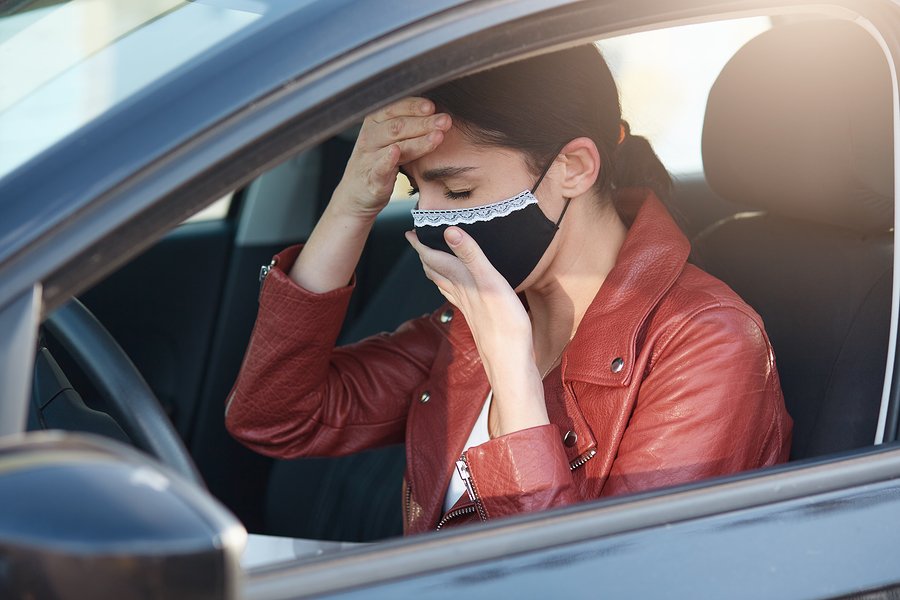Illness doesn’t just pose a threat to public health. It can also be a matter of road risk.

Introduction to the Risks
Driving while sick can be a significant threat to road safety, posing risks not only to the sick driver but also to other drivers, pedestrians, and passengers. When a person is unwell, their driving ability can be severely impaired, increasing the likelihood of a car accident. Common illnesses like the common cold, flu, or other medical conditions can affect driving skills, leading to slower reaction times, impaired vision, and decreased concentration. It is essential to understand the risks associated with driving while sick and take necessary precautions to avoid accidents.
Illness doesn’t just pose a threat to public health. It can also be a matter of road risk. Operating a motor vehicle requires your full attention at all times. Many crashes occur because of distracted driving. So, is driving while sick considered distracted driving? Depending on the illness, being sick can lower your reaction times and cause issues behind the wheel.
Many cold medicines can make a driver drowsy, leading to potential legal consequences, and while driving yourself to work or to the doctor seems like the best idea, it could end in a car accident if you’re not careful. In some places, you may even get fined for driving while ill.
Sickness and Distraction
Driving while sick is distracted driving, no matter how you look at it. Illness-related fatigue can further impair your driving ability, making it as dangerous as driving under the influence. Any occurrence that requires you to take your eyes off the road can be categorized as distracted driving.
Blowing your nose or dealing with cold symptoms can be just as distracting. When you sneeze, you close your eyes and may even lose control of your vehicle. If you’re really sick, you could sneeze multiple times within a short distance, making for a dangerous drive. Not only does driving while sick put you at risk for an accident, but it also puts pedestrians, bicyclists, and other drivers on the road at risk of injury.
The Effects of Cold Medicine
There are a variety of different cold medicines that have different side effects. Both over-the-counter and prescription drugs can have side effects that impair driving. If you’re taking cold medicine, make sure you’re aware of the related side effects before you get behind the wheel of a car.
Sudafed, a popular cold relief medication, carries symptoms such as nervousness, restlessness, dizziness, anxiety, and in some cases, very fast heart rate, trouble breathing, or even hallucinations. In serious cases, Sudafed can cause psychosis and intense heart problems.
Prescription drugs can also pose significant risks. Many different medications have similar side effects. Driving on these medications can be dangerous, especially if you were to develop a more serious condition, like psychosis or hallucinations.
Illnesses to Avoid Driving With
There are many medical conditions that affect driving, including a cold or the flu. Other conditions can also affect driving, like cataracts or macular degeneration. If you’re struggling with any type of vision loss, you’ll want to receive an okay from your doctor before you return to the road. For commercial drivers, driving while sick can be considered illegal under certain regulations.
With disorders that cause recurring problems, like cataracts or epilepsy, it’s important to have a plan if you continue to drive. Epilepsy can range in severity from person to person, so you’ll want to consult with your doctor before making a decision.
When it comes to having a cold or the flu, it can sometimes be hard to decide whether or not you should be driving. If you don’t feel well enough to go to work, it’s likely that you shouldn’t drive yourself to the doctor’s office either. If you’re sneezing, coughing, or blowing your nose frequently, this is also a sign you should probably stay off the road.
Slower Reaction Times
It’s clear that driving with a cold or the flu can impact your ability to drive properly. There are many things that can take your eyes off the road, and if you’re too sick to walk around the house without sneezing repeatedly, you probably shouldn’t be driving either.
While sneezing, coughing, and blowing your nose are great reasons to stay out of the driver’s seat, slower reaction times are an even better reason. This is especially true when the weather is rainy or foggy, which are already driving hazards. Slower reaction times due to illness can be compared to those experienced by tired drivers. Both tired and sick individuals may demonstrate reduced attentiveness, increasing the risk of accidents on the road.
Think back to the last time you were sick. Remember how hard it was to keep your eyes open for a long period of time? Remember how sore your body was and how hard it was to pay attention to everything that was going on? Imagine driving like that.
Not only is driving sick considered distracted driving, but it’s also dangerous because your reaction times are much slower when you’re sick. You may not be able to react fast enough to what’s happening around you, and you may ultimately cause a car accident.
Driving While Sick vs. Driving Under the Influence
You could argue that driving while sick isn’t a lot different from driving under the influence of alcohol. In both situations, a person gets behind the wheel knowing they’re not in the best frame of mind to drive safely. Accidents can occur in both scenarios, and the sick driver may be liable for any injuries or property damage they cause.
Safe Driving Practices
To drive safely, it is crucial to be aware of the risks associated with driving while sick. If you are feeling unwell, it is best to stay home and rest. However, if you must drive, make sure to take regular breaks to rest and stretch. Avoid driving during peak hours or in heavy traffic, and keep a safe distance from other vehicles. Be aware of your surroundings and adjust your driving accordingly. Consider having a passenger who can assist you if needed. Additionally, avoid taking over-the-counter or prescription medications that can impair your driving ability. By following these safe driving practices, you can minimize the risks associated with driving while sick.
Consequences of Reckless Driving
Reckless driving, including driving while sick, can have severe consequences. If you are involved in a car accident caused by a sick driver, you may be entitled to compensation for your injuries. However, if you are the sick driver, you may be held liable for any damages or injuries caused. In addition to the legal consequences, driving while sick can also lead to injuries, fatalities, and damage to property. It is essential to prioritize road safety and avoid driving while sick to prevent these consequences. If you are injured in a car accident caused by a sick driver, it is crucial to contact an attorney to discuss your options and seek compensation for your damages.
What if I’m Too Sick to Drive?
If you’re too sick to operate a vehicle, you’re in luck because there are many other options out there for you. This includes ridesharing services like Uber and Lyft. If you’re too sick to drive, having a friend or family member might be the best idea.
However, if no one is available, you can always look to ridesharing services. There are also many services that will bring you cold medicine and other things from the grocery store if you need them. There’s really no reason to get in a car and drive around if you’re too sick.
Is Driving While Sick Considered Negligence?
Driving while sick could be considered negligent. Establishing accountability for injuries caused by someone else’s negligence is crucial in personal injury claims. You may be able to make a case against someone who has injured you from driving while sick. Driving while sick is considered negligent because the driver actively chooses to get in a car and drive even though they’re aware that they’re sick. If you are injured by a negligent driver, you may be entitled to compensation for your injuries.
Can I File an Insurance Claim if a Sick Driver Caused My Accident?
Yes, you can file an insurance claim. If you’re not at fault, you don’t deserve to bear your medical costs, lost wages due to missing work, or any other accident-related expense. If that claim is to be successful, however, you’ll have to prove the other driver’s fault by gathering substantial evidence, such as photos of the accident scene and indicators of the other driver’s condition.
How to Prove that the At-Fault Party’s Health Affected Their Driving Ability
If you’re in an accident caused by a sick driver, proving their illness played a role in causing the wreck is challenging. Illness can be a contributing factor to negligence in driving. But if you have the help of a skilled personal injury attorney, you’ll have the best chance of getting the money you deserve.
You’ll need to show a direct link between the at-fault driver’s health condition and their inability to drive safely. Your attorney may have to obtain the other driver’s medical records or bring in a medical expert to explain how the driver’s illness affected their ability to drive safely.
Certain health conditions can impair a person’s cognitive or physical ability. Someone with the flu, for example, might experience weakness or dizziness. As you learned earlier, these issues could impair their ability to focus on the road and affect their reaction time. Establishing this cause-and-effect relationship is critical when pursuing a claim against a sick driver. Recognizing different factors, such as illness, is essential when determining fault in a collision.
An experienced lawyer can perform the nuanced investigation needed to prove the sick driver was at fault. This investigation can establish a compelling case and help you obtain maximum compensation.
Contact an Experienced Car Accident Attorney
If you’ve been injured by a sick driver, contact one of our experienced car accident lawyers for assistance today. We’re happy to look over your case and help you decide the best plan of action. For more information, please contact us online or at 772-225-4900.
